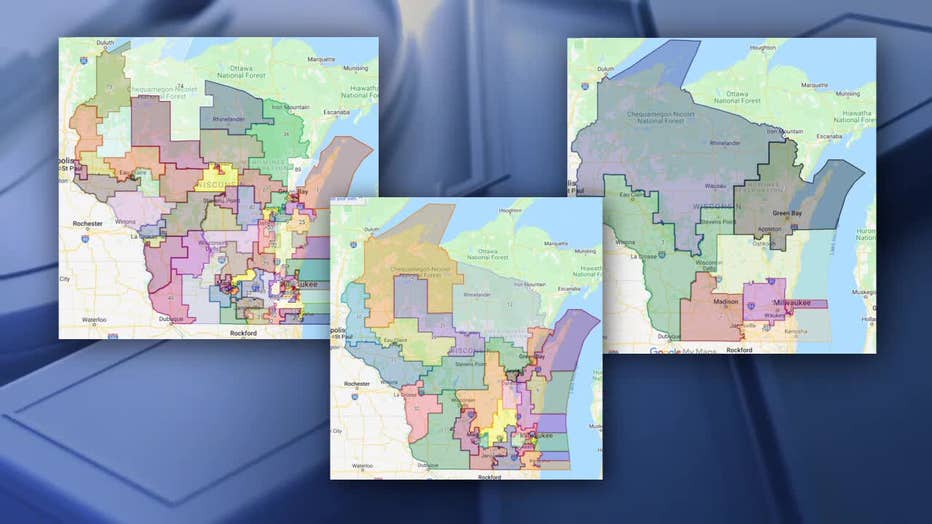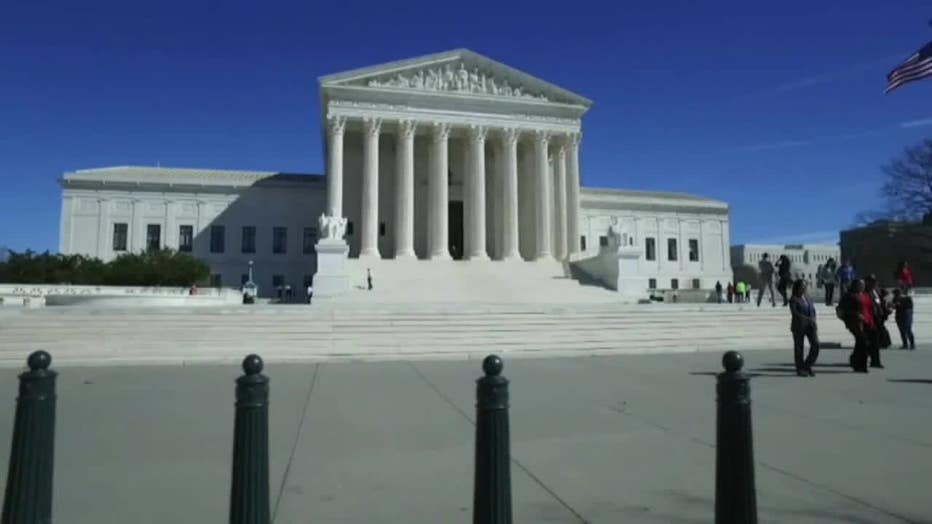Wisconsin redistricting, SCOTUS tosses Evers' state legislative maps

SCOTUS tosses Evers' redistricting maps
The U.S. Supreme Court tossed Wisconsin's new legislative maps proposed by Gov. Tony Evers, meaning who will represent voters is still an open question.
WAUWATOSA, Wis. - The U.S. Supreme Court tossed Wisconsin's new legislative maps proposed by Gov. Tony Evers, meaning who will represent voters in Madison is still an open question.
The decision has no impact on the April election, which are local races, but it does mean voters don't know which state legislative district they may fall into for the November election, when every Wisconsin Assembly seat and a portion of the Wisconsin Senate will be up for a vote.
"We don’t know who your representative is going to be, who the candidates are going to be in your district, all over the state of Wisconsin because we don’t have a map," said Sachin Chheda, Fair Elections Project director.
The once-a-decade U.S. Census leads to redistricting every 10 years. The Republican-controlled state legislature and the Democratic governor could not agree on district boundaries this time around, so the Wisconsin Supreme Court weighed the matter and told the parties it would pick the maps with the least change. After various groups submitted and argued for maps, the state justices picked Evers' maps – saying it would lead to the least change. His map also created one more African American majority district in the Wisconsin Assembly – a seventh overall in a current Wauwatosa-Brookfield seat.
That creation raised issues for the U.S. justices. Under the current maps, the 14th Wisconsin Assembly district represented by Democrat Robyn Vining includes parts of Milwaukee, but mainly runs through Wauwatosa and over to Brookfield. Under the Evers' map, the district would run north and south, including much more of Milwaukee. The Evers map makes the district a majority African American district.
The majority order declares: "…the Governor failed to carry his burden.
His main explanation for drawing the seventh majority black district was that there is now a sufficiently large and compact population of black residents to fill it—apparently embracing just the sort of uncritical majority-minority district maximization that we have expressly rejected."

District maps submitted by Gov. Tony Evers
State Sen. Lena Taylor (D-Milwaukee) criticized the Evers' maps because she thought they would actually water down the Black vote.
"In the governor’s map he put 8-10 White voting blocks, for example, in one district. Those White voting blocks will have stronger voting power than the percentage of African Americans that he left in the districts, which is a violation of Equal Protection and the Voter Rights Act," Taylor said. "I’m very excited to see that the (U.S.) Supreme Court has required the state Supreme Court to do what it did not want to do, which is its job, to make sure that we are protected."
The Evers' legislative maps would have kept the Republicans with the majority, but that margin likely would have been a few seats smaller.
While it was Republicans who filed the first appeal of the Wisconsin maps with the nation's highest court, Taylor also appealed the maps of her fellow Democrat.
"All I want is the law to be followed, and I don’t care if the Republicans draw maps that violate us, or the Democrats draw maps that violate us," added Taylor in an interview with FOX6 News. "If they violate us, they are wrong and they are not fair, and I’m glad that the Supreme Court saw that and ruled in our favor."
FREE DOWNLOAD: Get breaking news alerts in the FOX6 News app for iOS or Android.
The majority ruled against the state supreme court: "The question that our VRA (Voting Rights Act) precedents ask and the court failed to answer is whether a race-neutral alternative that did not add a seventh majority-black district would deny black voters equal political opportunity. Answering that question requires an ‘intensely local appraisal’ of the challenged district."
Justices Sonia Sotomayor and Elena Kagan dissented.
Wisconsin groups reacted to the court's order.
"We think that the United States Supreme Court did the right thing. Under our Constitution, decisions based upon race are highly dis-favored," Rick Esenberg with the conservative Wisconsin Institute for Law & Liberty told FOX6. "Expressly putting Black voters into particular districts, he was making a race-based decision. And our United States Supreme Court has made clear, the government can very rarely make race-based decisions. That important principle was vindicated."
"A little less than two months ago, Justice Cavanaugh said that making changes to local election machinery would cause chaos and confusion in Alabama. That’s exactly what’s happening here in Wisconsin," Chheda said in an interview with FOX6. "Unfortunately, it seems that they want to achieve their partisan ends, so I really think this is an example of judicial activism at the U.S. Supreme Court."

U.S. Supreme Court (SCOTUS)
The U.S. Supreme Court sends the case back to the Wisconsin Supreme Court with the clock ticking. In April, candidates start gathering signatures for Wisconsin Assembly and Wisconsin Senate races, with that paperwork to get on the ballot due in June.
In their order, the U.S. justices wrote, "On remand, the court is free to take additional evidence if it prefers to reconsider the Governor’s maps rather than choose from
among the other submissions. Any new analysis, however, must comply with our equal protection jurisprudence."
The U.S. Supreme Court's decision left in place the congressional maps which Evers proposed.
Official statements
Gov. Tony Evers:
"The good news with today’s decision is that the congressional maps we proposed will remain in place—that’s great news for the people of our state and our democracy, and it’s been a long time coming.
"Unfortunately, the Supreme Court of the United States today made a remarkable departure, even from their own recent actions, by deciding to reject our maps that the Wisconsin Supreme Court selected just a few weeks ago. Our maps are far better than Republicans’ gerrymandered maps we have now and their maps I vetoed last year, and we are confident our maps comply with federal and state law, including the Equal Protection Clause, the Voting Rights Act, and the least-changes standard articulated by the Wisconsin Supreme Court.
"If we have to go back to the Wisconsin Supreme Court—who have already called our maps ‘superior to every other proposal’—to demonstrate again that these maps are better and fairer than the maps we have now, then that’s exactly what we’ll do. I will not stop fighting for better, fairer maps for the people of this state who shouldn’t have to wait any longer than they already have to ensure their voices are heard."
Featured
Milwaukee County Overdose Dashboard created to understand trends
A Milwaukee County Overdose Dashboard has been created in order to understand the trends in both fatal and nonfatal overdoses and inform prevention efforts.
Featured
TSA intercepts gun at Mitchell International Airport; 7th in 2022
Transportation Security Administration officers prevented a handgun from making its way onboard an airplane at Milwaukee Mitchell International Airport on Tuesday, March 22.
Featured
Assembly Republican Ken Skowronski will not seek reelection
State Rep. Ken Skowronski announced Wednesday that he won't seek reelection this fall, bringing the number of Republicans retiring from the body to 10.

Richfield boy denied flight over airline's mask rule, family says
A Richfield family thought they properly notified the airline that their son, who has autism, has trouble wearing masks. Instead, they were told he couldn't fly.




